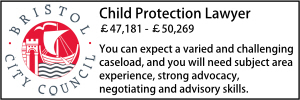LSB chief urges local government lawyers to take advantage of Alternative Business Structures
- Details
Local authority lawyers should seize the opportunities presented by the introduction of Alternative Business Structures in 2011, the chief executive of the Legal Services Board has said.
Speaking at a Bevan Brittan seminar on legal services regulation last week, Chris Kenny said local authorities needed to consider the impact of the changes being brought in under the Legal Services Act. In particular, he advised, they should analyse their role as commissioners, providers and employers.
On commissioning, he asked: “If you are dealing in a much more variegated commercial provider landscape, if you have got people out there offering to do commoditised work in a different way, how are you going to respond to it? What are the things that you currently do in-house that you might want to outsource?
“And what are the things that you currently outsource that you might want to do in-house or you might want to share with a local authority 40 miles down the road?”
Kenny suggested that local authority legal teams needed to assess whether they have the commissioning skills to deal with this new environment. Citing his experience at the NHS, he warned that there was a danger of building a service provider before the commissioning organisations were ready.
The LSB chief executive added that local government lawyers should look at how they can bolster their own offering as providers. “Do you want to follow the Kent model? Would the arrangements be informal, would it be some kind of consortium, would you go into the joint venture world, or would you even establish an ABS? How would your chief executives respond to that?”
A third consideration should be the effect of the new regime on local government legal teams as employers, and their recruitment and training practices. “Do people see themselves on the slow ladder to becoming the borough solicitor or head of legal or do they see themselves as jumping in and out of the public sector?” Kenny asked, arguing that it was essential to look at the skill set departments would require going forwards.
Kenny concluded: “There are a whole range of issues, many of which are swirling around already, but all of which the advent of alternative business structures will make sharper and more pointed than before.”
Calling on local authority lawyers to make the most of the new regime, he said: “This is a world where the glass is definitely half full for those who spot it and are able to respond.”
Iain Miller, partner and a professional regulation specialist at Bevan Brittan, highlighted the practical impact of the changes under the ABS regime, including the move towards licensing entities, rather than individuals. The regulation of all lawyers will become entity or firm-based, he added.
Miller said: “The obvious consequence is that in-house teams will be able to provide legal services to someone other than their employers if they are licensed to do so. The clear distinction between private practice and in-house practice may no longer exist. It would be perfectly possible for an in-house team in the public sector or the private sector to say they would like to be an ABS.”
The principal possibilities under the new regime include providing shared legal services through a separate corporate entity (as the current restriction on this will disappear), setting up a joint venture with a firm of solicitors in private practice or the provision of legal services by outsourcing organisations. “There’s no reason why Capita, for example, can’t say ‘we will have a legal services arm and we will bid for contracts to provide legal services to a local authority or indeed any other organisation’," Miller said.
Bethan Evans, a partner in the Communities and Local Government group at Bevan Brittan, acknowledged that there are intense financial pressures on local authorities and legal services “are not immune to that”.
She added: “Local authorities as customers will need – more than ever before – high quality legal advice if they are to deliver the agendas that they are trying to deal with.”
Evans pointed to the momentum towards shared services that can provide economies of scale, both in supply and commissioning. “In these straitened times, there will also be a push to maximise external income from whatever source it can be obtained, and legal services may be part of that. Will the new ownership and control rules for legal services offer new opportunities?”
Delegates at the seminar said the possibility of setting up an ABS was attractive but expressed concerns at the burden of entity-based regulation, the need for separate professional indemnity cover and the potential impact of the successor practice rules if the ABS venture is deemed not to have been a success.
“The preferable route may be to go down the shared services idea, particularly with transactional activity, and keep in-house somebody who is going to be your monitoring officer and deal with your corporate support,” said one attendee.
However, there was confidence in the ability of local government lawyers to survive the changed environment, and the possible arrival of outsourcing organisations.
“In-house legal teams in local government have always been faced with work going out,” one participant said. “We’ve had compulsory competitive tendering. We’ve now got various structures such as shared services. We should be looking at ABSs as a tool…. and how we can use it to our own advantage.”
Local authority lawyers should seize the opportunities presented by the introduction of Alternative Business Structures in 2011, the chief executive of the Legal Services Board has said.
Speaking at a Bevan Brittan seminar on legal services regulation last week, Chris Kenny said local authorities needed to consider the impact of the changes being brought in under the Legal Services Act. In particular, he advised, they should analyse their role as commissioners, providers and employers.
On commissioning, he asked: “If you are dealing in a much more variegated commercial provider landscape, if you have got people out there offering to do commoditised work in a different way, how are you going to respond to it? What are the things that you currently do in-house that you might want to outsource?
“And what are the things that you currently outsource that you might want to do in-house or you might want to share with a local authority 40 miles down the road?”
Kenny suggested that local authority legal teams needed to assess whether they have the commissioning skills to deal with this new environment. Citing his experience at the NHS, he warned that there was a danger of building a service provider before the commissioning organisations were ready.
The LSB chief executive added that local government lawyers should look at how they can bolster their own offering as providers. “Do you want to follow the Kent model? Would the arrangements be informal, would it be some kind of consortium, would you go into the joint venture world, or would you even establish an ABS? How would your chief executives respond to that?”
A third consideration should be the effect of the new regime on local government legal teams as employers, and their recruitment and training practices. “Do people see themselves on the slow ladder to becoming the borough solicitor or head of legal or do they see themselves as jumping in and out of the public sector?” Kenny asked, arguing that it was essential to look at the skill set departments would require going forwards.
Kenny concluded: “There are a whole range of issues, many of which are swirling around already, but all of which the advent of alternative business structures will make sharper and more pointed than before.”
Calling on local authority lawyers to make the most of the new regime, he said: “This is a world where the glass is definitely half full for those who spot it and are able to respond.”
Iain Miller, partner and a professional regulation specialist at Bevan Brittan, highlighted the practical impact of the changes under the ABS regime, including the move towards licensing entities, rather than individuals. The regulation of all lawyers will become entity or firm-based, he added.
Miller said: “The obvious consequence is that in-house teams will be able to provide legal services to someone other than their employers if they are licensed to do so. The clear distinction between private practice and in-house practice may no longer exist. It would be perfectly possible for an in-house team in the public sector or the private sector to say they would like to be an ABS.”
The principal possibilities under the new regime include providing shared legal services through a separate corporate entity (as the current restriction on this will disappear), setting up a joint venture with a firm of solicitors in private practice or the provision of legal services by outsourcing organisations. “There’s no reason why Capita, for example, can’t say ‘we will have a legal services arm and we will bid for contracts to provide legal services to a local authority or indeed any other organisation’," Miller said.
Bethan Evans, a partner in the Communities and Local Government group at Bevan Brittan, acknowledged that there are intense financial pressures on local authorities and legal services “are not immune to that”.
She added: “Local authorities as customers will need – more than ever before – high quality legal advice if they are to deliver the agendas that they are trying to deal with.”
Evans pointed to the momentum towards shared services that can provide economies of scale, both in supply and commissioning. “In these straitened times, there will also be a push to maximise external income from whatever source it can be obtained, and legal services may be part of that. Will the new ownership and control rules for legal services offer new opportunities?”
Delegates at the seminar said the possibility of setting up an ABS was attractive but expressed concerns at the burden of entity-based regulation, the need for separate professional indemnity cover and the potential impact of the successor practice rules if the ABS venture is deemed not to have been a success.
“The preferable route may be to go down the shared services idea, particularly with transactional activity, and keep in-house somebody who is going to be your monitoring officer and deal with your corporate support,” said one attendee.
However, there was confidence in the ability of local government lawyers to survive the changed environment, and the possible arrival of outsourcing organisations.
“In-house legal teams in local government have always been faced with work going out,” one participant said. “We’ve had compulsory competitive tendering. We’ve now got various structures such as shared services. We should be looking at ABSs as a tool…. and how we can use it to our own advantage.”
Regulatory/Litigation Lawyer
Legal Director - Government and Public Sector
Governance Lawyer
Contracts Lawyer
Lawyer (Planning and Regulatory)
Education Lawyer
Antisocial Behaviour Legal Officer
Locum roles
 When needs trump all: a guide to navigating modest asset cases - 42 Bedford Row
When needs trump all: a guide to navigating modest asset cases - 42 Bedford Row
05-12-2025
Online (live)
 Planning, Property and Power Webinar Series: challenging grid connection decisions - Landmark Chambers
Planning, Property and Power Webinar Series: challenging grid connection decisions - Landmark Chambers
05-12-2025 10:00 am
Online (live)
 HMPL Building Blocks: Law and Procedure Following Death of a Tenant - Devonshires
HMPL Building Blocks: Law and Procedure Following Death of a Tenant - Devonshires
09-12-2025
Online (live)
 Renters’ Rights: Challenges to rent increases in the First-tier Tribunal - Devonshires
Renters’ Rights: Challenges to rent increases in the First-tier Tribunal - Devonshires
11-12-2025 11:00 am
Online (live)
 Masterclass – Mental Health Act – Legal Update - Peter Edwards Law Training
Masterclass – Mental Health Act – Legal Update - Peter Edwards Law Training
17-12-2025
Online (live)
 Masterclass – MCA and Court of Protection - Legal Update - Peter Edwards Law Training
Masterclass – MCA and Court of Protection - Legal Update - Peter Edwards Law Training
21-01-2026
Online (live)
 Managing settlements: the legal and practical issues, and the pitfalls to avoid - Blake Morgan
Managing settlements: the legal and practical issues, and the pitfalls to avoid - Blake Morgan
22-01-2026 10:00 am
Online (live)
 Children and Young People (DoL, Competency and Capacity) - Peter Edwards Law Training
Children and Young People (DoL, Competency and Capacity) - Peter Edwards Law Training
28-01-2026
Online (live)
 HMPL Building Blocks: Legal Tools to Combat Anti-Social Behaviour - Devonshires
HMPL Building Blocks: Legal Tools to Combat Anti-Social Behaviour - Devonshires
17-02-2026
Online (live)
 Freedom of thought, belief and religion: Article 9 ECHR - Francis Taylor Building
Freedom of thought, belief and religion: Article 9 ECHR - Francis Taylor Building
19-02-2026
Online (live)
 Grappling with S73 - variations of conditions applications or appeals - Ivy Legal
Grappling with S73 - variations of conditions applications or appeals - Ivy Legal
09-03-2026
Online (live)
 HMPL Building Blocks: Tenancy Management – Assignment, Mutual Exchange and Succession - Devonshires
HMPL Building Blocks: Tenancy Management – Assignment, Mutual Exchange and Succession - Devonshires
12-03-2026
Online (live)
 Section 31(2A) Senior Courts Act: where have we got to? - Francis Taylor Building
Section 31(2A) Senior Courts Act: where have we got to? - Francis Taylor Building
18-03-2026 1:00 pm
Online (live)
 Save the Date: The Law of Public Rights of Way, Commons and Town or Village Greens Seminar (Hybrid) - Francis Taylor Building
Save the Date: The Law of Public Rights of Way, Commons and Town or Village Greens Seminar (Hybrid) - Francis Taylor Building
25-03-2026
London
 HMPL Building Blocks: A Housing Officer’s Guide to Court Proceedings - Devonshires
HMPL Building Blocks: A Housing Officer’s Guide to Court Proceedings - Devonshires
14-04-2026
Online (live)






































































































 The Employment Rights Bill Conference - Westminster Insight
The Employment Rights Bill Conference - Westminster Insight  First Aid Level 3 - LBL Skills
First Aid Level 3 - LBL Skills  Capsticks Housing Diploma
Capsticks Housing Diploma  Education Law Conference - 3PB
Education Law Conference - 3PB  Annual Planning Seminar 2026 - No.5 Barristers
Annual Planning Seminar 2026 - No.5 Barristers 